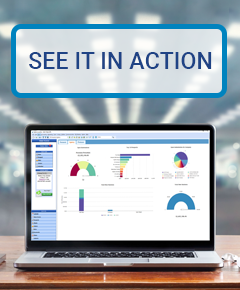
Agency Management System Best Practices, Agency Operations, Change Management
Inventor and Founding Father Benjamin Franklin is known for many things. One of which is knowing the value of planning. It is Franklin that both said “An ounce of prevention is worth a pound of cure,” and “Failing to plan is planning to fail.” Clearly, Franklin owed some of his success to the art of thinking ahead.
So, too, should you with your agency, specifically during an agency management system conversion. This seemingly overwhelming task is manageable: if you break it down and make a plan. We’ve heard time and again from our partner agencies how strategic thinking and planning made all the difference in their transition.
Below are the areas they considered, along with their advice on how to make the switch as painless as possible.
People and Processes
“We started with online, do-it-yourself training to get familiar with the system. That was really helpful…and a team of three folks came out for a week to assist us. It was hands-on, in-person training. That was icing on the cake. It helped us become comfortable with the system so we could use it on our own. – Jeff Cole, Cole Harrison Insurance
The first areas to target are your processes and the people related to them. Get your staff on board by allowing them to test the system and take their opinions on what works and what doesn’t. Next steps include:
- Determine how elements like checks and invoices will look on the new system
- Audit your workflows and define the most efficient ones
- Get your team trained: plan regular, weekly sessions four to six weeks before your switch
- Empower staff as super users, using them as resources during the transition
Agency Data
“One thing we tried to do was clean up our data before we moved it over. We knew if we put garbage in our system, we’d get garbage out. The SIS team was great in working with us to make that happen”. – John Horvath, Neverman Insurance
Data is a huge part of your agency. You want your data to be clean and complete once it’s in your new system. Get your data to transfer by following these guidelines:
- Clean up your data: get rid of duplications and old accounts and ensure currents records are accurate and up-to-date
- Reiterate good data entry practices to keep data clean
- Communicate with your new provider to learn what will convert smoothly and what won’t
- Create a back-up of your data! This an important safety net
Setting Expectations
“(W)ere there a couple of things we had to edge around or plow through? Sure. Were they insurmountable? No. Going from a frankly archaic agency management software to Partner XE, we saw way fewer hiccups than I ever anticipated”. – Andrea Nelson, Unisource Insurance
Anyone who has been though a management system transition knows that it takes some work, but the effort is worth the pay-off. The key is preparation and being clear with expectations:
- Be honest with your staff: remind them successful transition is a team effort and it’s about how you tackle hiccups together
- Have patience – with yourself and your team – knowing there will be growing pains, but this, too, shall pass
- Pick the right time, paying attention to when you’re less busy and can dedicate time and effort to a successful transition
- Take advantage of support and training
Get to Know Your Provider
“The training has been top-notch…there was a whole team that came out and worked with us for multiple days and stayed in contact after…they were in constant contact…That is a huge compliment to SIS.” – Britt Linder, Peterson Insurance Services
Who your provider is makes a huge difference, especially during your agency transition. Look for a provider who will:
- Walk with you through the conversion process
- Be available before, during, and after your transition
- Communicate the transition process clearly and honestly
- Provide varying levels of support and training depending on your needs
Want more tips to ease your transition? Check out our Conversion Checklist eGuide and other resources at sispartnerplatform.com.

Agency Management System Best Practices, Agency Operations
Like any small business, independent insurance agencies are continually searching for ways to improve. Whether it be better quality service, streamlined operations, or a more effective way of doing business, each improvement makes an impact.
The phrase “data analysis” may seem intimidating. But, once your agency has set up reporting measures, capturing data is easy and interpretation is intuitive.
Though your agency could report on any number of areas, two of the most telling are with finances and employees. Below are a few of the reporting areas that can help you gain information on where your agency stands, so you can determine where you need to go.
See another important insurance agency reporting area here
Data Tracking: Finances
Finances tend to come to mind first when talking about data. There are a few areas to investigate to get a read on how your agency is performing financially. To get a handle on your agency’s finances, set up reports to track these two important areas:
- Revenue: Track income from new customers, line additions for existing customers, and any other way you’re making money. Set up reporting once, so you don’t have to scramble when you need this pertinent info.
- Income loss: Look at areas where you’re losing business. Pay attention to patterns. Is there a certain time of year, policy type, or point in your sales process where more business is lost than others?
See where your data comes from and how you can use it
Data Tracking: Employee Performance
Just as important as your finances is how your employees are performing. The two go hand-in-hand. The more efficient and productive your staff is, the better you’ll do as an agency. Two key tracking areas include:
- Call analysis: This data lets you know the end result of each phone call you or your producers make to prospects or customers. Call analysis reports can tell you two things: 1) if your outreach methods are netting positive results and 2) what sequences or methods are working better than others. You can use this information to adjust your tactics for more positive results.
- Employee productivity: You can track what your employees are doing and how long it takes them to do it through your agency management system. The goal here is not to monitor your staff’s every move, but to get an idea of which processes are taking longer than others. Then, you can work to make those tasks move faster, whether it be through new workflows or eliminating the task through automation.
Learn more on evaluating your agency’s data gathering habits
Leveraging your Agency Management System
Your agency management system is by far the best tool for collecting and reporting on data. Your system should have built in reports and the option to create your own custom read-outs. Once your agency has established good data gathering habits, pulling reports is as easy as clicking a button.
Find out even more ways to leverage your management system
Another great capability to leverage is integrated accounting, which floods your financial data into and out of your agency management system. Integrated accounting not only saves you from entering the same data twice, it ensures records in your management system are up to date. And, since all your finances are found in your management system, you can again pull any report with one keystroke.
You can find out more about the benefits of accounting integration, standard and custom reporting, email integration, and other valuable agency management system capabilities on the SIS website. You’ll get information on Partner XE, our premier agency management system challenging the status quo in the insurance industry. View a demo and get in touch with one of our experienced team members. Get all the answers at sispartnerplatform.com.

Agency Operations, Perpetuation
There are many things we put off in life: dentist appointments, paying our taxes, that last nagging home improvement project. Whatever they are, these delayed tasks tend to be more of a hassle simply because we put them off.
Now is the time to cross it off!
We hear from our partner agencies that they are resisting perpetuation planning because they don’t know where to start. That’s why we’ve put time and effort into creating resources on this topic. Below are just some of the many tools at your disposal to help plan your agency’s transition.
Perpetuation Planning Resources
Your Best Resource to Plan Ahead
One of the most important aspects of perpetuation planning is organizing agency records. The best tool for keeping those records in order is the hub of your agency data: your management system.
Start now by organizing agency data the way you want with personalized workflows and custom reporting, both of which are offered through Partner XE. These simple enhancements make it easy for you and you staff to enter and track data, setting you up for a successful transition.
Check out more Partner XE capabilities here. We’re always available to help your agency serve better, work more efficiently, and reach your goals. Get in touch with us today to schedule a demo and find out more on the Partner XE system.

Technology Trends
Whether or not you like, know, or even understand digital insurance services, it’s clear independent agencies need to embrace them. A recent CB Insights look at tech in insurance showed insurance technology startups raised $1.7 billion in 2016. That’s no small potatoes.
Such high investment in companies producing digital insurance tools signals a need for insurers to keep up or get left behind. But, it can be hard to tell which digital tools are worth the investment. We put together a quick list of some top tools to keep your agency in the game.
Mobile Access
Mobile access to your agency website and management system benefit both customers and employees alike. Agents can use mobile to look up and update prospect and customer info on the road. Customers use mobile to make claims onsite and look up their policy information 24/7.
Read more on why mobile is one of the top digital insurance tools
Client Portals
Similar to mobile, client portals give customers greater access to their personal and policy information and make it easier for agencies to process customer requests. Client portals exist on your website and feed into your agency management system, capturing customer information instantly.
Comparative Raters
This online tool quickly compares carrier rates, helping you give your customers the best price, fast. Many raters integrate with management systems, making them even easier to use.
Get more info on comparative rater benefits and how to access them
Paperless workflows
You’ve heard it again and again. Paperless workflows not only speed up agency processes, but they make things easier for customers and prospects. Talk about a win-win. Your agency can go paperless with underwriting, eSignatures, and document scanning and storage.
Find out more on going paperless
Secure Servers
The more your agency digitizes, the more vulnerable you become to cyber-attacks. As you add more tech-based tools, keep your agency data safe with secure servers. Servers should be off-site, contain complex data encryption, and have redundant back-ups.
Too often agencies shy away from tech, mistakenly believing it will remove the human connection that makes independent insurance so unique. At SIS, we strive to seek that balance – working with our clients to make our Partner XE agency management system the most advanced tool to support their independence.
Find out how SIS and Partner XE can enhance your agency service. Contact us at 800.747.7005, Option 6 or [email protected].

Marketing, Technology Trends
As an independent agency owner, where do you devote most of your time and energy? Perhaps you answered “talking to customers” or “tracking new business.” Maybe you even said “marketing.” But, chances are you didn’t say “working on my agency website.”
Though your agency website may not be top of the list, it should at least be on the list. No matter how great your service or value, if no one knows your agency exists it’s all meaningless.
See four essential elements your agency website needs
How can your agency website serve as an effective mouthpiece? It must attract – and keep – attention. It must be engaging to both prospects and customers alike. An engaging agency website does the following:
1. It draws people in
Your site should catch the surfer’s eye, no matter what device they’re using. This means it’s responsive: adaptable to laptops, desktops, tablets and phones alike. The content on your homepage needs to be dynamic and easy to digest (more images than text!). Use your agency social media platforms to pull in ever-changing content, keeping your site fresh.
Do you have a responsive website? Find out why you need one
2. It keeps them reading
The content on your site should speak to viewers. Talk about what your audience wants to hear. Blogs are a great way to convey audience-friendly content. And, if you’re unsure what to write about, other agency blogs are a great source of inspiration. You can spread the work around, too. Have individuals from different departments take a stab at creating content. Multiple contributors keep your site interesting, and the different points of view draw in a larger variety of people.
3. It’s easy to navigate
One of the biggest website bounce factors is clunky navigation. If it takes users too long to find what they’re looking for, they leave. Make the most relevant info easy to find. Such info includes requesting a quote, listing your services, showing staff bios, and displaying agency contact information.
Learn more about how a client portal can benefit your agency and customers alike
4. It’s easy to find
Getting users to your website may be one of your largest hurdles. Ensure your website is included in all promotional material, business cards, and staff email signatures. Additionally, focus on boosting your rank in search. Create and execute a keyword strategy, including relevant search terms in page titles and image descriptions in your site’s metadata. Focus on local terms to decrease competition and increase impact.
Find out more on creating and executing a search strategy
Finally, make sure your agency website is uniquely you. It’s the independent nature of your agency that attracts and keeps loyal customers. Display who you are proudly and use that to your advantage.
It’s this uniqueness that draws us at SIS to serving independent agencies. We see each Partner XE agency as an individual and take pride in building and maintaining a distinct partnership. See how those partnerships take shape in our client stories or get in touch with us to find out more in person. You can reach us at [email protected] or 800.747.7005, Option 6.





